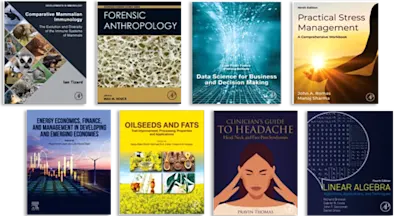
Autophagy in Health and Disease
- 2nd Edition - September 22, 2021
- Imprint: Academic Press
- Editors: Beverly Rothermel, Abhinav Diwan
- Language: English
- Paperback ISBN:9 7 8 - 0 - 1 2 - 8 2 2 0 0 3 - 0
- eBook ISBN:9 7 8 - 0 - 1 2 - 8 2 2 0 0 4 - 7
Autophagy in Health and Disease, Second Edition provides a comprehensive overview of the process of autophagy and its impact on human physiology and pathophysiology. It expand… Read more
Purchase options

Institutional subscription on ScienceDirect
Request a sales quoteAutophagy in Health and Disease is invaluable to anyone new to the field as well as established investigators looking for a broader understanding of autophagy from outside their specific field of study.
- Provides a comprehensive overview of the process of autophagy and its impact on human physiology and pathology
- Offers extended coverage of the mechanisms that mediate autophagy
- Covers the role of autophagy in stem cells and induced pluripotent stem cells, as well as the regenerative process of paligenosis
- Highlights important questions that remain to be addressed
Section I - Overview
1. Introduction
Beverly A. Rothermel and Abhinav Diwan
2. Mechanisms of autophagy: the machinery of macroautophagy and points of control
Congcong He
3. Regulation of autophagy - transcriptional, posttranscriptional, translational, and posttranslational mechanisms
Logan Slade and Thomas Pulinilkunnil
4. Selectivity and trafficking of autophagic cargoes
Nuzhat Ahsan, Kautilya Kumar Jena, Subhash
5. The role of lysosomes in autophagy
Yoana Rabanal-Ruiz and Viktor I. Korolchuk
6. Methods for measuring autophagy
Allen Andres
7. Effects of physiologic inputs on autophagy
Tobias Eisenberg, Mahmoud Abdellatif, Senka Ljubojević-Holzer and Simon Sedej
Section II - Development
8. Autophagy in germ cells, stem cells, and induced pluripotent stem cells
Moydul Islam, Ngoc Uyen Nhi Nguyen, Abhinav Diwan and Beverly A. Rothermel
9. Role of autophagy in embryogenesis
Takayuki Tatsumi and Satoshi Tsukamoto
10. Autophagy in hematopoiesis and leukemogenesis
Angela Ianniciello and G. Vignir Helgason
11. Autophagy in cell plasticity with particular focus on paligenosis
Megan D. Radyk, Lillian B. Spatz and Jason C. Mills
Section III - Metabolic control and diabetes
12. Autophagy in the liver
Mark Li and Ling Yang
13. Autophagy in adipose tissue
Vishaka Vinod and Sihem Boudina
14. Autophagy in the pancreas
Amelia Williams, Merilin Georgiou and Catherine Arden
15. Skeletal muscle
Greg R. Markby and Kei Sakamoto
Section IV – Cardiovascular System
16. Autophagy in the cardiovascular system
Daniel Peñ-Oyarzún, Valeria Garrido-Moreno, Luis Garrido-Olivares, Ramon Corbalan, Alfredo Criollo and Sergio Lavandero
17. Lungs
Poornima Mahavadi, Martina Korfei and Andreas Guenther
18. Autophagy in the vasculature
Bieke Steenput, Cédric HG. Neutel, Nina Hermans, Wim Martinet, Guido R.Y. De Meyer, Pieter-Jan Guns and Lynn Roth
Section V - The nervous system and neurodegeneration
19. Altered autophagy on the path to Parkinson's disease
Irene Sanchez-Mirasierra, Sergio Hernandez-Diaz, Saurav Ghimire, Patrick Main and Sandra-Fausia Soukup
20. Autophagic processes in early- and late-onset Alzheimer's disease
Chenglong Xie, Yahyah Aman, Johannes Frank, Maria Jose Donate-Lagartos, Ruben Gudmundsrud, Kateřina Čechová, Liu Shi, Martin Vyhnalek and Evandro F. Fang
Section VI – Homeostasis and disease in other organ systems
21. Autophagy as an integral immune system component
Elizabeth Bueno, Samuel Wyatt, Robyn Duttenhefner, Daniel Asa, Srinivasulu Dasanna and Sangita C. Sinha
22. Autophagy in the gastrointestinal system and cross talk with microbiota
Felipe X. Pimentel-Muiños
23. Role of autophagy in building and maintaining the skeletal system
Olivier Camuzard, Marie-Charlotte Trojani, Georges F. Carle and Vale´rie Pierrefite-Carle
24. Autophagy on the road to longevity and aging
Maria Manifava and Nicholas T. Ktistakis
25. Autophagy in cancer: friend or foe?
Silvia Vega-Rubín-de-Celis
26. Mammalian microautophagy: mechanism and roles in disease
Takahiro Seki and Hiroshi Katsuki
27. Chaperone-mediated autophagy - mechanisms and disease role
Amelina Albornoz, Alvaro Sequeida, Christian Rodríguez and Mauricio Budini
28. Targeting autophagy: lifestyle and pharmacological approaches
Alfredo Briones-Herrera, Tania Gómez-Sierra, Elena Martínez-Klimova, Belén Bellido and José Pedraza-Chaverr
- Edition: 2
- Published: September 22, 2021
- No. of pages (Paperback): 454
- Imprint: Academic Press
- Language: English
- Paperback ISBN: 9780128220030
- eBook ISBN: 9780128220047
BR
Beverly Rothermel
AD